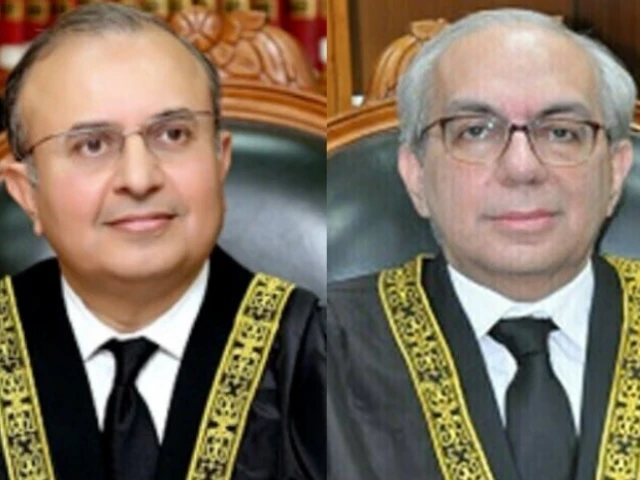Image collage of Justice Mansoor Ali Shah and Justice Munib Akhtar. — SC website
ISLAMABAD:
Two members of the Supreme Judicial Council (SJC) – Justice Syed Mansoor Ali Shah and Justice Munib Akhtar – have raised strong objections to the approval of the amended Judges’ Code of Conduct, warning that the changes undermine judicial independence, centralise authority and could be misused to silence dissenting judges.
In a detailed letter to the SJC, the two judges said, “We are passing through testing times, when democracy itself faces strain and constitutional institutions are being tested. In such moments, a strong, fearless, and independent judiciary is the last and only refuge of the people”.
“Any measure that curtails that independence or can be weaponised to discipline, silence, or control judges must be viewed with the utmost caution and resisted firmly,” they cautioned.
The judges warned that the new provisions were particularly dangerous because they could be used selectively against individual judges. They said the breadth and vagueness of the amendments allow “selective application” to suppress inconvenient or dissenting voices.
They also noted that after the 26th Constitutional Amendment, such centralisation of power makes the judicial system more fragile, not stronger. Judicial independence cannot rest on the perceived virtue or courage of one person; it must be distributed, not centralised, they stressed.
Both judges maintained that the amendments to the code of conduct dilute independence, suppress transparency and centralise control in a manner inconsistent with both the Constitution and international standards.
They also took issue with the assumption embedded in Article XIX that the Chief Justice is “immune from influence” and capable of resisting pressure once it is reported to that office.
“Equally troubling is the fanciful assumption underlying Article XIX: that the Chief Justice is immune from influence and institutionally capable of resisting pressure once it is reported to that office.”
“Experience has shown that when the institution itself is under strainespecially in the after-math of the 26th Constitutional Amendmentsuch concentration of authority makes the system more fragile, not stronger,” they wrote.
Objection to Justice Dogar’s inclusion
Both judges objected to the inclusion of Islamabad High Court Chief Justice Sarfraz Dogar as an SJC member, noting that an intra-court appeal concerning his transfer case is still pending.
They stated that the SJC meeting should be postponed until a final decision on the appeal.
“The SJC’s authority rests squarely upon public trust and confidence. With respect, the participation of Justice Dogar in the meetings or proceedings of the Council while the aforementioned appeals remain pending may, even if unintended, cast doubt upon or undermine the credibility of any decisions rendered by the Council during such pendency,” they wrote.
“We have no doubt that Justice Dogar himself, recognising the gravity of this forum and the importance of public confidence in its work, would consider it incumbent upon himself to recuse from the Council during the pendency of the appeals and a final decision thereon. Any such step would be in line with the imperatives of transparency, constitutional propriety, and institutional integrity.”
The two judges also strongly objected to the discussion of the Judges’ Code of Conduct in the National Judicial Policy Making Committee (NJPMC), arguing that the body lacks constitutional authority to consider such amendments.
“No Member of the Council, including the Chairman, has the authority to place proposed amendments before any other body, least of all the NJPMC, which has no constitutional competence in this regard,” they wrote.
They said since the three chief justices participating in the SJC are also ex officio members of both the NJPMC and the SJC, their participation in approving the amendments at the NJPMC meant that “the majority of the SJC had effectively pre-decided the matter before it was even placed before the Council.”
“The two remaining Members were thereby excluded from the process and deprived of equal participation,” they said.
The judges argued that the proposed amendments could not lawfully be considered by the present SJC. “At the very least, constitutional propriety required that the matter be taken up only by a reconstituted Council under Article 209, excluding those Members who had participated in the NJPMC deliberations,” they stated.
They said their objections were overruled by the majority, which proceeded to “pass” the same amendments that had already been approved a day earlier.
The two judges warned that the proposed changes, including the amendment of Article V, the insertion of Article XIX, and the incorporation of the 2003 SJC Resolutions, raise grave concerns about the independence, autonomy, and transparency of the judiciary.
“These proposals, if adopted, will restrict judicial freedom, transform an open and collegial institution into a closed and hierarchical one, and create avenues for controlboth internal and external,” they said.
The letter concluded with a clear recommendation that no amendment to the Judges’ Code of Conduct should be made until the decision on the 26th Constitutional Amendment is finalised.

